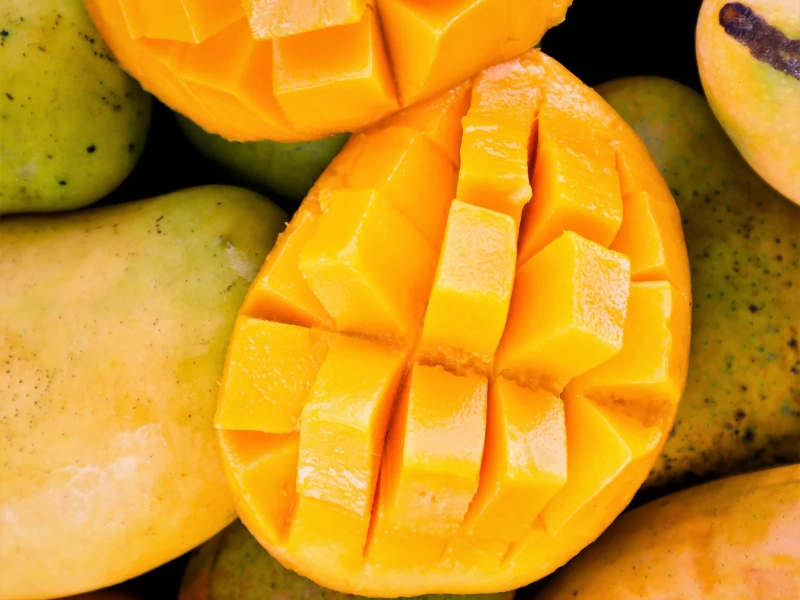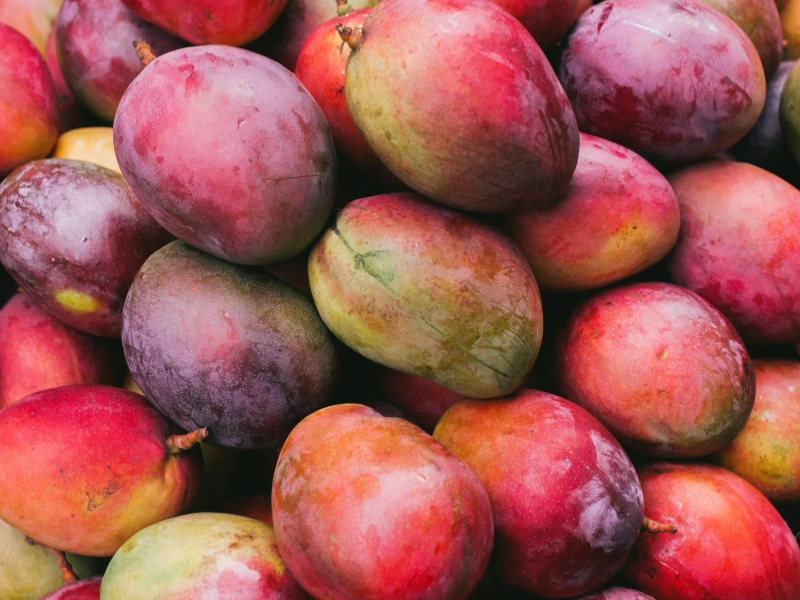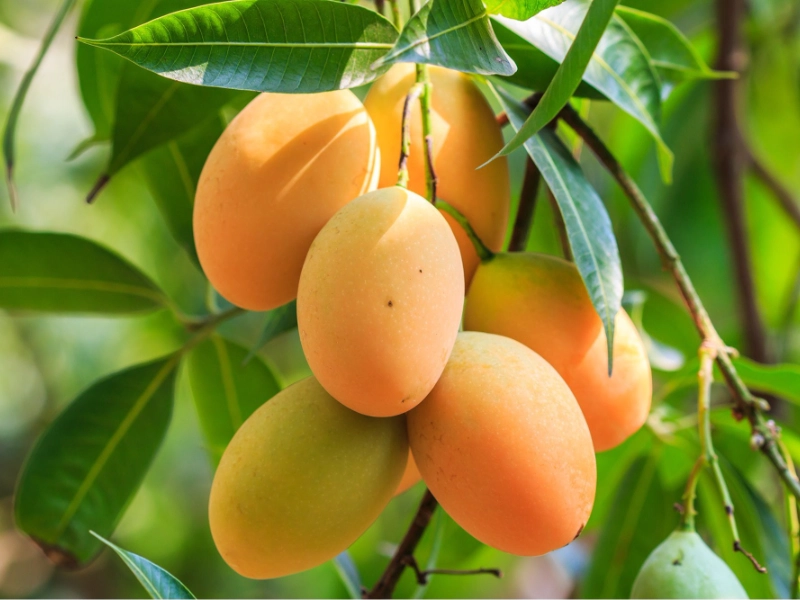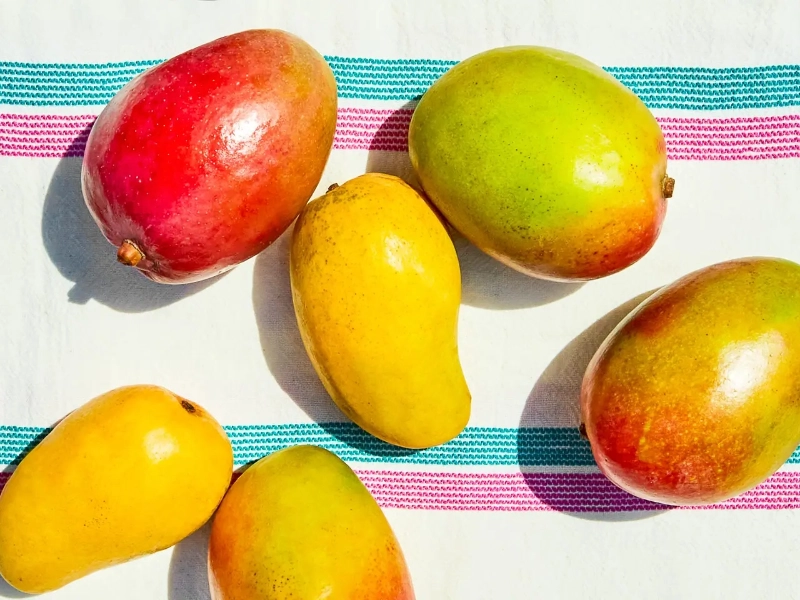Often referred to as the "king of fruits," mangoes are not only great but also really high in important nutrients. Loved all around for its sweet, juicy taste and vivid color, this tropical delicacy is Knowing the nutritional profile of mangoes will assist you to value their health advantages and properly include them into your diet. This page explores the several nutrients mangoes contain, their health advantages, and how to enjoy this fruit in several ways.

Because they are high in minerals and vitamins, mangoes are a healthy addition to any meal. Vitamin C is one of the most important components in mangoes; it helps the immune system be strengthened, skin condition be promoted, and iron absorption be facilitated. For those trying to boost their immune system, one cup of mango offers around 100% of the daily advised consumption of vitamin C. Apart from vitamin C, mangoes provide a substantial supply of vitamin A mostly in the form of beta-carotene. Maintaining good vision, boosting immune system function, and encouraging skin integrity all depend on this antioxidant. Mangoes also include many B vitamins, including B6, which is vital for metabolism and brain function. Mangoes' mineral composition consists in magnesium and potassium, both of which are essential for preserving normal blood pressure and supporting muscular action. Mangoes' vitamin and mineral profile helps them to be a superfood in general really greatly.
 Mangoes' dietary fiber level is also really significant. Since it controls bowel motions and avoids constipation, fiber is vital for digestive health. About five grams of dietary fiber are found in one mango, which helps to explain the advised daily consumption for adults. Including foods high in fiber, such as mangoes, can assist your gut be more healthy and your digestion will be better generally.
Furthermore connected to several health advantages outside digestion is dietary fiber. Through encouraging sensations of fullness and lower total calorie consumption, it can help with weight control. Furthermore linked to a reduced incidence of chronic diseases including type 2 diabetes and heart disease are diets high in fibers. Mangos can help you improve your long-term health and increase your fiber intake by including them into your meals and snacks.
Mangoes' dietary fiber level is also really significant. Since it controls bowel motions and avoids constipation, fiber is vital for digestive health. About five grams of dietary fiber are found in one mango, which helps to explain the advised daily consumption for adults. Including foods high in fiber, such as mangoes, can assist your gut be more healthy and your digestion will be better generally.
Furthermore connected to several health advantages outside digestion is dietary fiber. Through encouraging sensations of fullness and lower total calorie consumption, it can help with weight control. Furthermore linked to a reduced incidence of chronic diseases including type 2 diabetes and heart disease are diets high in fibers. Mangos can help you improve your long-term health and increase your fiber intake by including them into your meals and snacks.
 Not only are mangoes nutritious, but they also abound in phytochemicals and antioxidants that add to their health advantages. Linked to many chronic disorders, these chemicals help shield the body from oxidative stress and inflammation. Mangiferin, quercetin, and anthocyanins—some of the main antioxidants in mangoes—each help to support health.
Renowned for its anti-inflammatory action, quercetin might help lower the risk of chronic conditions including cancer and heart disease. Another potent antioxidant present in mangoes, mangiferin, has being investigated for its possible anti-cancer effects and metabolic health supporting qualities. Responsible for some mango kinds' vivid colors, anthocyanins have antioxidant properties as well. Mangoes help you to boost your consumption of these helpful substances, therefore boosting general health and well-being.
Not only are mangoes nutritious, but they also abound in phytochemicals and antioxidants that add to their health advantages. Linked to many chronic disorders, these chemicals help shield the body from oxidative stress and inflammation. Mangiferin, quercetin, and anthocyanins—some of the main antioxidants in mangoes—each help to support health.
Renowned for its anti-inflammatory action, quercetin might help lower the risk of chronic conditions including cancer and heart disease. Another potent antioxidant present in mangoes, mangiferin, has being investigated for its possible anti-cancer effects and metabolic health supporting qualities. Responsible for some mango kinds' vivid colors, anthocyanins have antioxidant properties as well. Mangoes help you to boost your consumption of these helpful substances, therefore boosting general health and well-being.
 Additionally helpful for weight control is including mangoes in your diet. Mangoes are a guilt-free dessert even if they are naturally sweet since they have rather few calories. With about 150 calories, a medium-sized mango is a pleasant snack that can reduce sweet cravings without adding too many calories.
Mangoes' high fibre content helps to manage appetite and lower the risk of overeating by adding to sensations of fullness. Mangoes are also a great choice for pre- or post-workout snacks since their natural sugars give a rapid energy source. Mangos are a great fruit that supports your weight-control objectives and offers necessary nutrients when included into your meals.
Additionally helpful for weight control is including mangoes in your diet. Mangoes are a guilt-free dessert even if they are naturally sweet since they have rather few calories. With about 150 calories, a medium-sized mango is a pleasant snack that can reduce sweet cravings without adding too many calories.
Mangoes' high fibre content helps to manage appetite and lower the risk of overeating by adding to sensations of fullness. Mangoes are also a great choice for pre- or post-workout snacks since their natural sugars give a rapid energy source. Mangos are a great fruit that supports your weight-control objectives and offers necessary nutrients when included into your meals.
Mangoes are rather flexible and fit for many different kinds of cooking. To boost taste and nutrients, they can be consumed fresh, blended into smoothies, or tossed in salads. Mangoes also shine in salsas, a reviving variation on grilled meats and shellfish. Many cuisines call for their sweet taste since it complements both savory and sweet meals. Mangoes can be used in desserts, such mango sorbet or fruit tarts, for those wishing to explore the kitchen. They also provide a tropical touch to any meal when combined into sauces or condiments. There are so many ways to eat mangoes, hence including this fruit into your diet can be fun as well as good for your health.
Knowing their seasonal availability and how to choose the best fruit would help one to appreciate mangoes. Usually in season in the summer months, mango availability differs depending on the location. Fresh mangoes are best enjoyed in many nations between late spring and early summer. But because to worldwide trade, mangoes are usually available in grocery shops year-round. Choose mangoes based on their somewhat soft to the touch indicator of ripeness. The variety will affect the color of the skin, hence texture and scent are also rather important. A ripe mango will smell sweetly, like fruit. Choosing ripe mangoes guarantees that you will enjoy the fruit at its tastiest and most flavorful, therefore optimizing both taste and nutritional value.